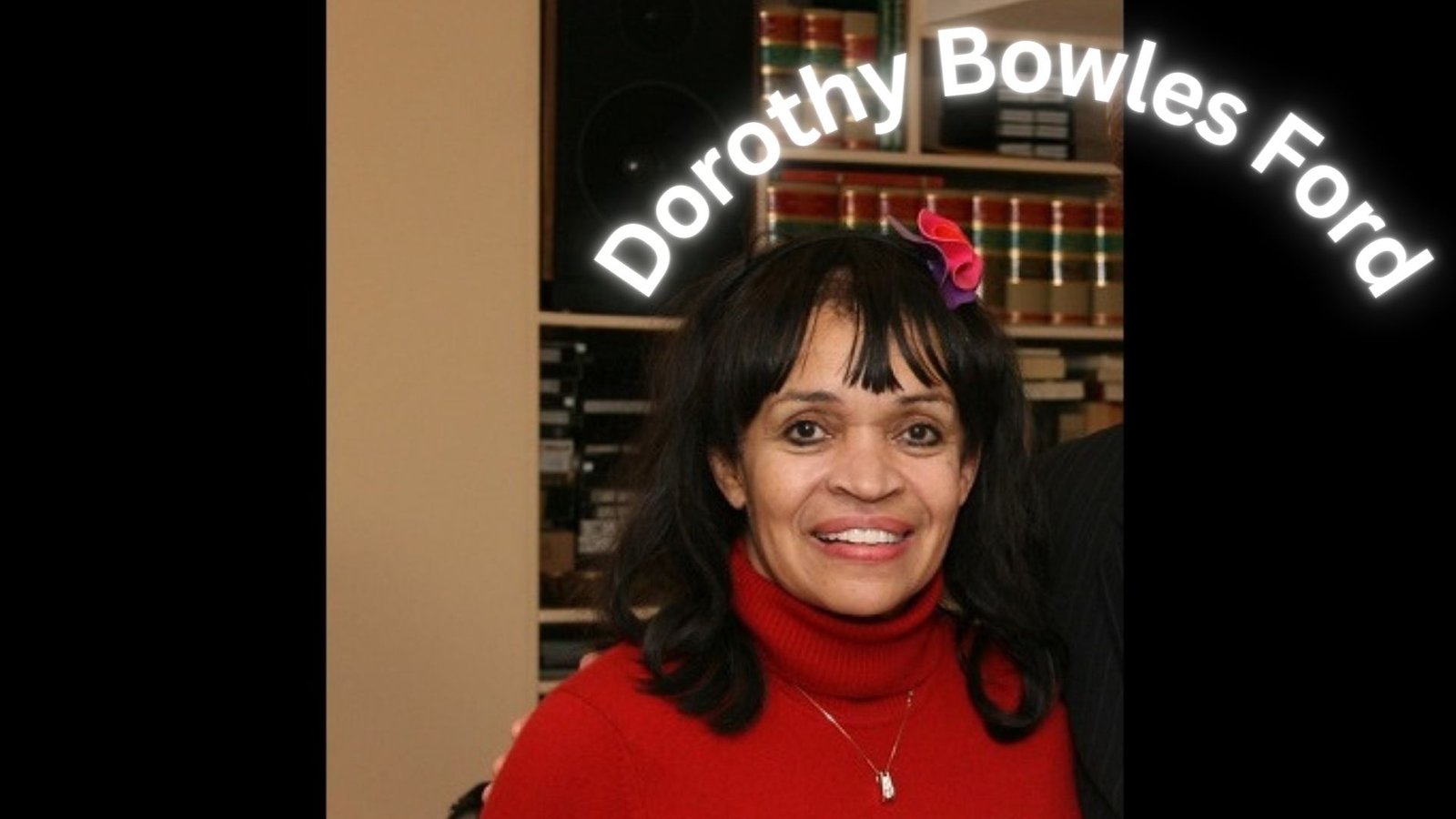Dorothy Bowles Ford stands as a significant figure in journalism and media education. Her work in shaping media ethics and standards has had a lasting impact on the industry. From her contributions to journalism education to her pioneering research, Dorothy Bowles Ford’s name carries weight in academic and media circles.
This article explores Dorothy Bowles Ford’s influence, contributions, and the broader importance of her work. We’ll also discuss the relevance of her teachings in today’s fast-evolving media landscape, the challenges faced in modern journalism, and practical ways her insights remain applicable.
Who Is Dorothy Bowles Ford?
Dorothy Bowles Ford was an esteemed journalism professor, media ethics expert, and author. Over her long career, she has shaped the academic approach to media ethics and communication, helping to raise standards in the journalism profession.
Ford was best known for her work at the University of Tennessee, where she taught aspiring journalists the importance of integrity and responsibility in news reporting. Her textbooks, such as “Reporting for the Media” (co-authored), are still widely used in journalism programs around the world.

The Early Life and Education of Dorothy Bowles Ford
Born in the mid-20th century, Dorothy Bowles Ford pursued an education that gave her deep insights into media practices. She attended Northwestern University, where she earned both her Bachelor’s and Master’s degrees in journalism. This solid educational foundation, combined with her passion for accurate and ethical reporting, positioned her as a trailblazer in journalism education.
Dorothy Bowles Ford’s Contributions to Journalism
Dorothy Bowles Ford contributed to journalism not just through her research and publications, but also through her teaching and leadership roles in academia. She taught thousands of students who went on to shape media practices across the country.
Teaching Journalism with Integrity
One of Ford’s key contributions was her emphasis on journalistic integrity. She believed that good journalism wasn’t just about reporting facts but about doing so in a responsible, ethical manner. This commitment to ethical journalism influenced generations of students who have entered the media industry with a strong moral compass.
Publications and Research
Dorothy Bowles Ford authored several influential textbooks on journalism and communication. Her most well-known publication, “Reporting for the Media”, remains a fundamental textbook for journalism students. The book provides a detailed look into the responsibilities of reporters, how to gather and report news accurately, and how to navigate ethical dilemmas in the media industry.
Her research on media ethics, freedom of the press, and journalism standards also contributed significantly to the academic discourse on these topics. Through her research, Ford helped solidify the role of ethics in journalism curricula.
The Importance of Media Ethics
Ethics in journalism play a critical role in maintaining public trust. Dorothy Bowles Ford’s work focused heavily on this aspect, reinforcing the notion that journalists must balance freedom of speech with the responsibility of truth-telling.
Ethical Reporting in Today’s Media
The media landscape has changed dramatically since Ford’s time, with the rise of digital news, social media, and the 24-hour news cycle. However, the ethical standards she championed are more relevant than ever. In an age of misinformation and fake news, maintaining integrity is paramount. Journalists must still hold themselves accountable, ensuring their work is accurate and unbiased, even in a fast-paced news environment.
Teaching Ethics to Future Journalists
Ford’s teachings highlight the importance of ethics in journalism education. For media students, learning how to handle the pressure of reporting while remaining truthful is essential. Her influence extends far beyond the classroom, shaping the ethical guidelines that many news organizations follow today.
Benefits of Studying Dorothy Bowles Ford’s Work
Studying Ford’s work offers numerous benefits, particularly for those interested in media, communication, and journalism.
For Aspiring Journalists
Aspiring journalists can gain a strong foundation in media ethics by studying Dorothy Bowles Ford’s work. Her textbooks and teachings provide practical advice on how to handle real-world challenges, from reporting on sensitive topics to verifying sources. This guidance remains invaluable in today’s media landscape.
For Media Organizations
Media organizations can also benefit from incorporating Ford’s principles into their standards. Her focus on accuracy, accountability, and fairness can help news outlets build and maintain trust with their audiences, a vital component in an age of increasing skepticism toward the media.
For Researchers and Academics
For researchers and academics, Ford’s contributions offer a rich source of material for further study. Her research on media ethics provides a foundation for ongoing discussions about the role of journalism in society, making her work a critical reference point for those studying the evolution of media standards.
Applications of Dorothy Bowles Ford’s Principles
Dorothy Bowles Ford’s principles have been applied across various sectors of the media industry. From traditional news outlets to digital journalism, her teachings on ethics continue to inform how news is gathered, reported, and presented.
Case Study: Ethical Dilemmas in Investigative Journalism
One clear application of Ford’s principles can be seen in investigative journalism. Investigative reporters often face difficult ethical decisions, such as protecting confidential sources or deciding whether to publish sensitive information. Ford’s teachings provide a framework for addressing these dilemmas, ensuring that journalists can navigate complex situations while maintaining their ethical responsibilities.
Impact on Digital Journalism
The digital age has transformed journalism, but the ethical issues remain the same. Whether it’s clickbait headlines or sensationalist stories designed to attract traffic, modern journalists face numerous challenges. Ford’s emphasis on truth and accountability offers a timeless solution to these issues. Her teachings remind digital journalists that the core values of the profession—truth, fairness, and responsibility—must not be sacrificed for clicks.
Media Regulation and Ethics
Media organizations and regulatory bodies continue to use the standards that Ford championed to hold journalists accountable. Her work has influenced the creation of ethical guidelines used by organizations such as the Society of Professional Journalists (SPJ), which sets standards for journalistic behavior. These guidelines reflect many of the same values Ford espoused, including truthfulness, independence, and minimizing harm.
Challenges in Upholding Media Ethics
Despite the widespread recognition of media ethics, journalists and media organizations still face significant challenges in maintaining these standards.
The Pressure to Publish Quickly
In today’s fast-paced media environment, journalists are often pressured to publish stories as quickly as possible. This can lead to mistakes, sensationalism, and ethical lapses. Ford’s emphasis on accuracy and thoroughness serves as a reminder that the quality of reporting should never be sacrificed for the sake of speed.
The Rise of Fake News
The proliferation of fake news and misinformation has made it more difficult for readers to trust media outlets. This challenge has amplified the importance of media ethics, as journalists must work harder to distinguish their reporting from unreliable sources. Dorothy Bowles Ford’s teachings on accountability are vital for combating the spread of false information.
Balancing Objectivity and Advocacy
Another challenge in modern journalism is balancing objectivity with advocacy. Many journalists are passionate about the issues they cover, but they must still strive to present the facts fairly and without bias. Ford’s teachings on journalistic integrity provide a guide for how to balance these competing priorities, ensuring that reporters can advocate for change while remaining objective.
Solutions for Modern Journalists
While the challenges in upholding media ethics are significant, solutions do exist. By following the principles that Dorothy Bowles Ford laid out, modern journalists can maintain ethical standards even in a rapidly changing industry.
Fact-Checking and Verification
One of the most important steps journalists can take is to ensure that their stories are thoroughly fact-checked and verified. Ford emphasized the importance of accuracy in reporting, a principle that remains relevant today. Journalists can maintain their credibility by ensuring that all information in their stories is backed up by reliable sources.
Accountability and Transparency
Ford’s work also underscores the importance of accountability and transparency. Journalists must take responsibility for their work and be willing to correct mistakes when they occur. This level of transparency helps build trust with audiences and ensures that media outlets maintain their integrity.
Educating the Next Generation
Finally, the next generation of journalists must be educated on the importance of ethics. Ford’s work provides an excellent foundation for teaching students how to navigate the complexities of modern journalism. By instilling a strong sense of responsibility in future reporters, educators can help ensure that ethical journalism remains a cornerstone of the industry.
Conclusion
Dorothy Bowles Ford’s contributions to journalism and media ethics have left a lasting legacy. Her teachings continue to influence journalists, educators, and researchers, providing a framework for ethical reporting in an ever-evolving media landscape. From the challenges of the digital age to the ongoing importance of accountability and accuracy, Ford’s work remains as relevant today as it was during her career.
By following the principles that Dorothy Bowles Ford espoused, modern journalists can navigate the challenges of today’s media environment while maintaining the ethical standards that are essential to the profession.
FAQs
1. Who was Dorothy Bowles Ford?
Dorothy Bowles Ford was a journalism professor and media ethics expert known for her contributions to journalism education and research.
2. Why is Dorothy Bowles Ford’s work still relevant today?
Her focus on media ethics, accountability, and accurate reporting is critical in today’s fast-paced, digital news environment, where misinformation is a growing concern.
3. What is the significance of Ford’s textbook, “Reporting for the Media”?
Ford’s textbook is a widely used resource in journalism education, offering practical advice on ethical reporting, accuracy, and media responsibility.
4. How did Dorothy Bowles Ford influence media ethics?
She shaped the way media ethics are taught in journalism schools, promoting accountability, transparency, and fairness in reporting.
5. How can modern journalists apply Ford’s principles?
Journalists can apply her principles by fact-checking their stories, maintaining transparency, and upholding accuracy in their reporting, especially in the digital age.



